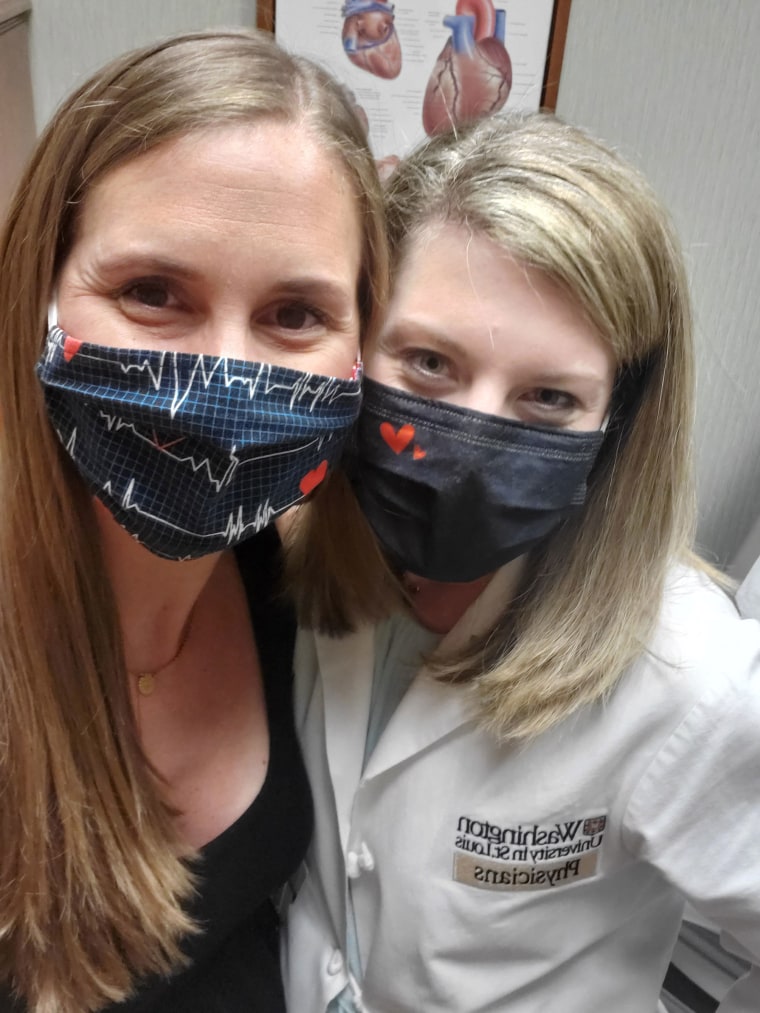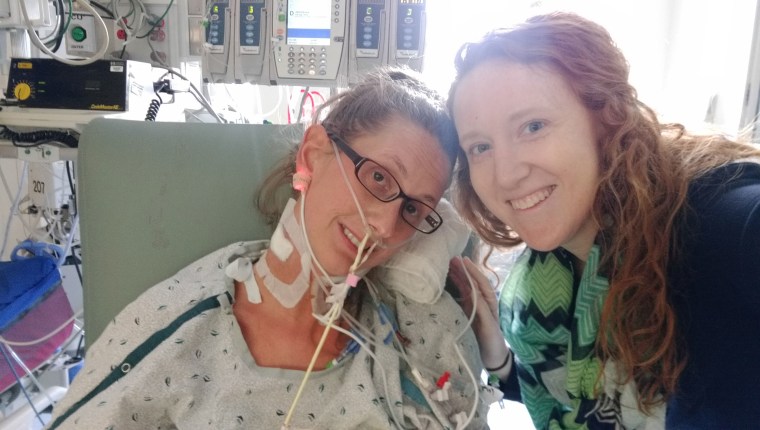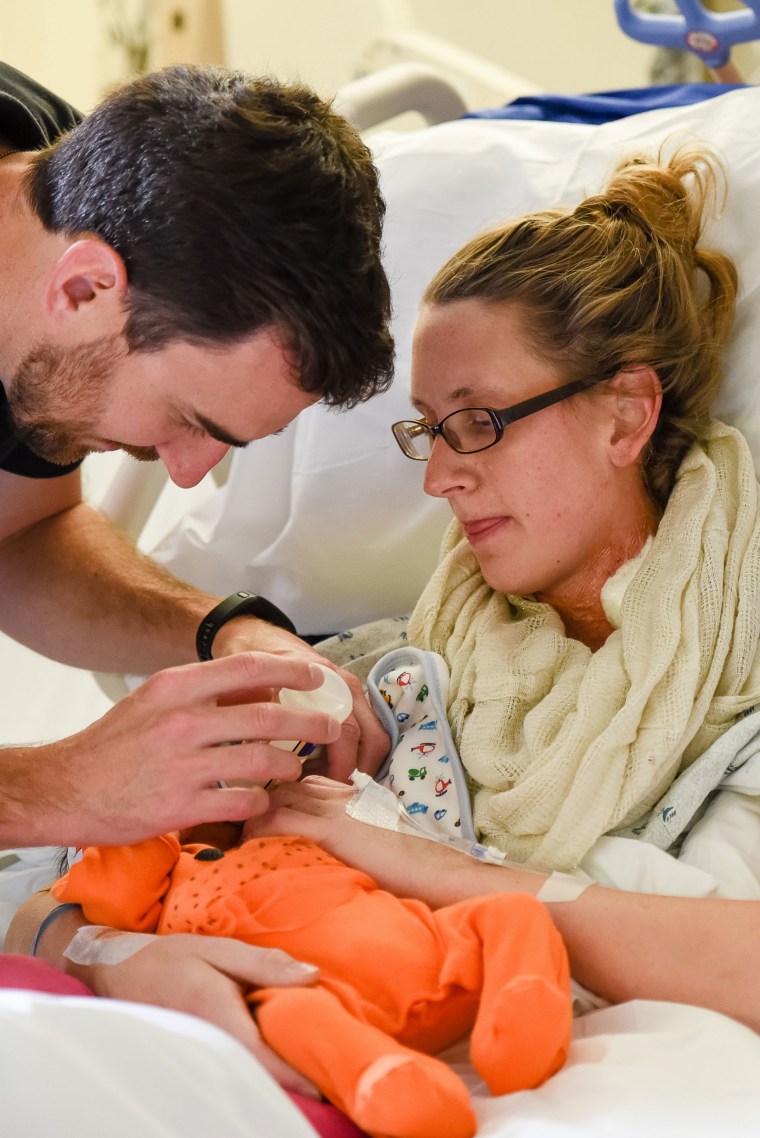When Jessica Grib of St. Louis was about 32 weeks pregnant with her second child, her blood pressure started rising. At the time, the then-30-year-old thought little of it.
“I wasn’t really concerned,” Grib, now 36, told TODAY. “I didn’t think that anything was going to happen.”
Her doctor prescribed her medication, but her blood pressure didn’t lower. Even bed rest did little to help. After delivering the baby, Grib went into cardiac arrest. She learned she had peripartum cardiomyopathy, a type of heart failure or weakness of the heart muscle that occurs at the end of pregnancy or within the first five months of delivery, Grib's doctor, Dr. Kathryn Lindley, director of the Women’s Health Center at Vanderbilt University, told TODAY. The rare condition can be hard to detect because it mimics pregnancy symptoms, according to the American Heart Association.
“(I) want to raise awareness about this disease,” Grib said. “I really want people to be comfortable advocating for themselves, to know the signs and symptoms of peripartum cardiomyopathy and heart failure.”

Increasing blood pressure late in pregnancy
When blood pressure medication and bed rest did little to help Grib, her doctor suggested delivering her baby at 37 weeks. She agreed. At the last minute, the baby, Amelia, turned breech, and doctors needed to perform a cesarean section. As Grib lay in the recovery room, she started crashing.
As staff tried to bring her to the cardiac catheterization lab, a room with diagnostic equipment that can generate images of the heart, she needed CPR for 10 minutes.
“It was very obvious that I was having a heart event," Grib explained. "One of the nurses was a new father himself, and his whole mantra was, ‘We’re not going to lose her.’”
Doctors implanted an Impella heart pump, and she was later transferred to another hospital, where she was placed on ECMO, a type of life-support machine that works like external heart and lungs, according to the American Thoracic Society. The two devices worked together to support her while her heart recovered.
“I was basically on maximal life support hours after my daughter was born,” Grib said. “They definitely had no idea what was happening with me.”
For two weeks, Grib was sedated on life support and couldn’t see her daughter. Her husband split his time between two hospitals in St. Louis. When Grib woke, she finally met her daughter.
“Meeting her was very emotional,” Grib said. “We had a photographer come in and capture that moment. … I really love and hate those pictures at the same time.”

Three weeks after Amelia’s birth, Grib went home.
“I was sure that I was just going to go home and die. Honestly, I thought I was going to have a stroke or that I was going to bleed out because my blood pressure was still sky high. My heart rate was off the charts,” she said. “Miraculously I did not.”
Doctors later discovered Grib had a rare tumor called a paraganglioma, which grows outside the adrenal glands on top of the kidneys, that contributed to her heart failure. This tumor is extremely rare, occurring in two out of 1 million people, according to the National Cancer Institute.
“Dr. Lindley was the one that identified the tumor," Grib said. "She thought it was like her Hail Mary. She said, ‘I’ve heard of this. I’ve never actually seen it in a person before.' She’s like, ‘This is just my last shot of figuring out what’s going on with you.’”
In December 2016, Grib had the tumor removed.
Peripartum cardiomyopathy
Peripartum cardiomyopathy occurs in people where there isn't another obvious explanation for their weak heart muscles, Lindley told TODAY. She added that in the U.S. it affects about one in 2,000 women, though it's more common in other countries.
“There seem to be some environmental and other genetic factors that seem to contribute to the frequency of the disease,” she explained. “There’s a lot we don’t understand about it.”

The symptoms of peripartum cardiomyopathy can be similar to what many experience in late pregnancy, making it difficult to know when there is a problem. Lindley said symptoms include:
- Shortness of breath
- Excessive swelling
- Swelling that worsens after delivery
- A new cough without symptoms of a cold or infection, which can be a sign of fluid in the lungs and needs medical attention
Lindley said some people are at greater risk, including:
- People over the age of 35
- People who've had multiple babies
- People with family history of heart failure
- People with chronic high blood pressure
- People with a history of preeclampsia
- Black women
While the condition may sound devastating given that it's a type of heart failure, people do overcome it.
“The good news is that the majority of people will have either recovery of their heart function or at least improvement of their heart function over time,” Lindley said. “Heart failure means that the heart is not able to appropriately keep up with the demands of the body. … it doesn’t mean that it’s an irreversible problem.”
Raising awareness
Since having her tumor removed, Grib has regular monitoring to make sure it hasn’t grown back. These types of tumors are most likely to return within the first five years, Grib's surgeon told her, and fortunately, she passed that five-year anniversary in December 2021. Still, she continues to undergo bloodwork and scans.
After several years of stable health, Grib and her husband decided to have more children, and she’s now pregnant with her fourth. She's not considered high risk either because a tumor caused her previous heart failure, and she's now tumor-free. Except for an extra echocardiogram and a blood test, her pregnancy doesn't require different care.
Grib wants pregnant people to know peripartum cardiomyopathy exists and to consult their doctors if they experience any symptoms.

“I hope that women are comfortable with advocating for themselves,” she said. “We want to raise awareness of (peripartum cardiomyopathy) and what people can do to help advocate for themselves. Like I said, the symptoms can be masked as pregnancy.”
